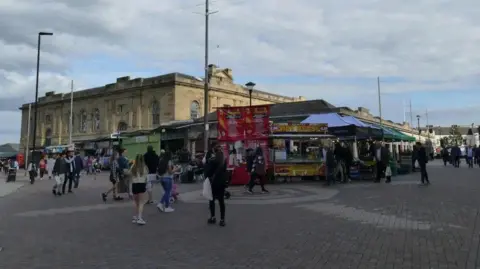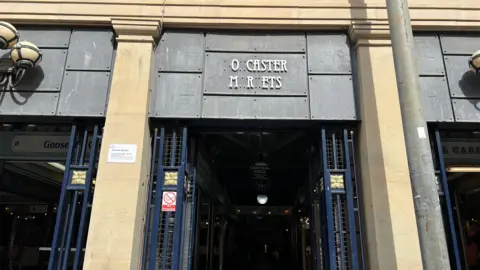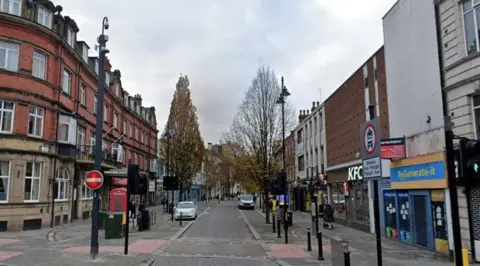'Why election matters in the city of three mayors'
 Stephen Craven/Geograph
Stephen Craven/GeographI'd just pressed record – to film a shot of Doncaster Markets – when I spotted that the "Doncaster" sign actually said "O CASTER".
Somewhere along the line DN had lost its D and N – and for people living within that postcode, Thursday will mark a chance for them to deliver their own letter; an X next to the name of the person they want to be the new mayor.
But what will the new mayor have to do?
Their brief ranges from the big decisions that are getting all the attention and the other big decisions that don't get as much coverage.
 James Vincent/BBC
James Vincent/BBCOften a big shiny thing dominates an election campaign and as I write this I am looking at one.
The sun is bouncing off the terminal at Doncaster Sheffield Airport, catching the wave design on its roof.
There is no need to fly anywhere today. Finningley is warmer than Fuerteventura – but of course you can't go anywhere from here anyway.
The modular terminal opened in 2005 with room and plans for more of them either side if things went well. Seventeen years later, the site is quiet.
Peel closed the airport in 2022 and said it wasn't viable anymore. 800 jobs were lost, and that's just the ones directly at the airport.
In the booklets sent out to all voters here, not one of the 12 candidates comes out as against the airport's planned reopening.
It is a huge decision and potentially a huge gamble. £100m of public money has been put up to try and get flights out of here again. The promise of jobs is also up against environmental concerns about opening a new airport.
It's a plan that will be decided on in the summer – a big moment for a mayor.
Perhaps the airport is easier to talk about because it's such a big thing. It would be a tangible success story for a mayor to reopen – but it would also be a key point of scrutiny for them. Are the public getting value for money?
Some of the other issues a mayor needs to address are arguably bigger – but perhaps are harder to quantify and sell to the public.
 Getty Images
Getty Images20% of people in Doncaster don't have any qualifications, the second highest rate in the country.
That might make you think education would be big topic for candidates, but there are scant mentions of it in their material.
Wages are lower here and there are more people out of work than on average. There are issues to sort out like there are in any northern city, but it doesn't feel like the candidates are talking about it much, if at all.
I was at Radio Sheffield's debate last week. Of the seven candidates invited only three turned up.
It feels like there has been low engagement so far from candidates. What will that means for voters where turnout has not broken past 30% in the last two polls?
Having a mayor in Doncaster was part experiment, part solution.
Directly elected mayors were a Labour idea, faster decisions made by one person rather than by committee.
 Google
GoogleWorries about too much power in one person's hands were assuaged by the bruising the town took during Donnygate, a scandal in which 20 former councillors were found guilty of expenses fraud.
Electing a mayor was meant to draw a line under that but it didn't stop the council making mistakes.
Lots of fallings out between mayors, councillors and chief executives were overshadowed by a failing of the town's children's services.
Seven deaths of vulnerable children saw the government step in to run the council. Three of the cases found that social workers had missed chances to intervene.
Doncaster has had a mayor in charge of its council for 23 years. It's now a city that has three mayors; civic, city and South Yorkshire.
Some places that went with the idea of directly elected mayors two decades ago have ditched it over the last few years.
Doncaster will elect another one on Thursday and whatever they focus on, it is an enormous job.
Listen to highlights from South Yorkshire on BBC Sounds, catch up with the latest episode of Look North.
